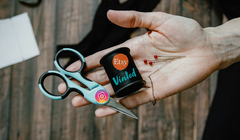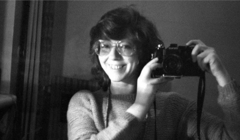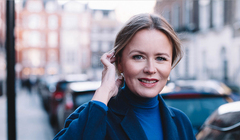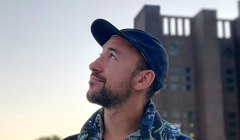
Virtual dating agencies have been around for almost half a century now. Currently, a total of roughly 8,000 online dating apps are available worldwide and a thousand new ones appear each year. Broadly, they can be divided into three categories; some work on personal compatibility, others are tied to specific locations and a third group is tailored to niche audiences. SoulMatcher is an international, psychology-based dating app which doesn't just help people find partners but also to understand them. Natalia Sergovantseva, the founder of SoulMatcher, tells us how depth psychology helps us to go beyond the superficialities of appearance and form happy relationships.
Please tell us about your app. What's its selling point when compared to other online dating services?
We launched the SoulMatcher app last year and it's aimed at people interested in psychology. While it’s true there are an awful lot of apps on the market these days, only a handful of them use psychological compatibility to help people find a partner and understand what makes them tick. As a rule, other apps use tests which don’t reveal depth psychology or help understand people's psychological makeup and how this affects relationships. Whether someone is an extrovert or an introvert is of secondary importance, as it's possible to adapt, but if someone has a disorder such as autism and lacks empathy, or is a narcissist with abusive tendencies, then that may become a problem. The use of depth psychology helps determine whether or not a couple will be able to live together and correlates well with successful family relations. Our app uses voluntary clinical testing to assess users. Three scales are used; Narcissism, Borderline and Empathy. Test results overlay photos to counter the power of good looks, as the main problem with most dating apps is that the most attractive 10% of users receive 80% of the likes, meaning selection is entirely appearance-based. Our scales, by contrast, show people’s psychological type. What if that handsome guy is a narcissist? We don’t just want people to choose by appearance; it’s better to take personal qualities into account.
A second way we stand out is that our users can evaluate each other using the contacts in the app. If permission is given, their details are extracted. You can see who's signed up and who's currently using the app. The most accurate way to judge character is by real-life observation of behaviour. Of course, there are some pitfalls. For instance, bad blood may lead to someone getting lower marks from their exes, but if someone's self-appraisal is markedly different from the ratings other people give them, there is likely to be a grain of truth in their criticisms and these opinions must be taken into account.
Many apps offer filters to improve people’s looks. Are people really still so fixated on appearance? Are you doing anything to combat this?
Each user goes through verification with a photo confirming their identity, but which photo they put in their profile and whether or not filters are used is a personal choice for everyone. All dating sites and apps face this problem, because everyone understands the most important thing is to pass the first test for potential partners, which is appearance. The second unfortunate trend is that both men and women hide their real ages. This can be verified using passport details, but virtually no applications I’m aware of do this, so when you first meet someone, you've got to be prepared for their real appearance and age to be quite different from what’s on their profile.

What role do psychologists play in your service?
You can make an appointment with a psychologist in the app. Choose the difficulty you would like to discuss from the menu and we will select a specialist for you. For instance, a client might be experiencing dating-related burnout or difficulties taking a relationship to the next level. We work with tried and tested experts. Eventually, we aim to create a marketplace for psychologists. Beyond that, we’re growing our presence on social media, on YouTube and Instagram. We’re planning to organise relationship courses. The app makes it possible to meet prospective partners, but for the relationship to succeed, you need to work on your boundaries, previous traumatic experiences and so on. For instance, the most common issue our users require help with is a need to process a past trauma which is stopping them from forming new relationships.
Why do most people sign up for your services? What capabilities do you offer those planning to get married?
We have a dating service which helps fulfil our clients’ two main requirements; forming long-term, serious relationships and an easier way to meet interesting people for dating and friendship. When somebody starts looking for a husband or wife, they immediately set a very high bar and they may not give some people a chance because they’ve decided they're not suitable, but if they're just looking for friendship, rapport may develop when they interact, leading to long-term relationships. In our app, there is an exclusive service resembling a marriage agency called VIP Concierge. The idea came about by chance, when our acquaintances started to come to us, both men and women. They wanted to find companions in life but weren't ready to set up public profiles. Of course, if people are using the services of a VIP matchmaker, they're thinking of forging long-term relationships, otherwise, why would they pay such a high rate? The cost of this service may reach a million roubles (£8,000). Currently, we have two options; either a six-month or year-long package, during which time we look for compatible partners according to very strict requirements, including professional skills, income levels, psychological profiles and appearance, or services on a pay-as-you-go basis for regions where we do not yet have clients. Instead of signing up for a package, each date is paid for separately.
How do you become a matchmaker in the 21st century?
You have to feel the calling. The matchmaker we work with has paired more than 40 couples and she previously had a successful career in banking.
How attractive is this market for investors?
It's a highly competitive sphere where the major players, Tinder and Bumble, take up 80% of the market and it's hard to push them back. There are also many small niche applications for which finding investment is a very complex exercise. To pique their interest, we have to offer more; relationship courses, the services of matchmakers and psychologists, visa support for international couples and so on.
How is AI used in the service?
We use machine learning for training models. It improves the accuracy of our assessment of people, selection of suggested potential partners and users’ reactions to them based on how many they have liked. We plan to continue doing this because the more users there are, the more accurately we will be able to fine-tune the AI so users see people who they find attractive when they open their accounts. What's more, our clinical test-based model has broader applications in society and is of interest to the psychological research community. Next year, master's students from Northeastern University in the US will use our data to conduct research.

Who is your target audience? How many users do you have?
They are people who have been disappointed in relationships in the past and want to approach them more thoughtfully and from a psychological perspective. This audience is quite diverse, but 80% of users are aged from 25 to 40. We have switched to manual verification, which has a much higher filtration rate, ensuring a more comfortable experience when users interact. A profile must have a minimum of three photographs. When complaints are made, profiles are immediately blocked. We've now launched monetisation, with everyone required to pay a subscription of €45 a year. This is another filter which excludes unnecessary people. There's also a reasonable limit on the number of people you can like; five a day. This makes users more thoughtful in their actions. We're not chasing after quantity; our priority is quality. Around 5,000 users have signed up for the application.
Did you previously have experience with online dating agencies?
Seven years ago, I met my husband on Tinder. He's American and at the time, he was working at Google. We moved to London, it's a city conveniently located between the US and Russia. I wasn't on the dating site for long as I quickly achieved what I went there for. The secret of my success was a well-made profile, clear goals, setting up a communication funnel and also the support of my psychoanalyst. This experience helped spark the idea of a marketplace for psychologists on a dating site. The selling point was the chance to talk live to a psychologist, so people could sort out issues such as why their dates weren’t leading to lasting relationships.
What's the right way to put together a profile?
The first thing is to present yourself as a personality and show your individuality. Try to intrigue people, say things like “Guess what three superpowers I have”, so they want to ask you questions. That's the easiest way to start a dialogue. A great many tools have appeared increasing the information we can find out about people; links to their profiles on social media, video and audio files, and prompts (phrases which need to be recorded in the application). Nevertheless, people’s looks remain the most important filter. Before starting to use a dating site I would recommend doing a professional photo session with a good photographer.
What countries do you now work in? Do you plan to expand geographically?
The application works in two languages: Russian and English. We’re present in the US, Britain and Russia. There are many Russian-speaking users. We plan to add French, German and Spanish. We will launch in countries speaking those languages to find new audiences.






